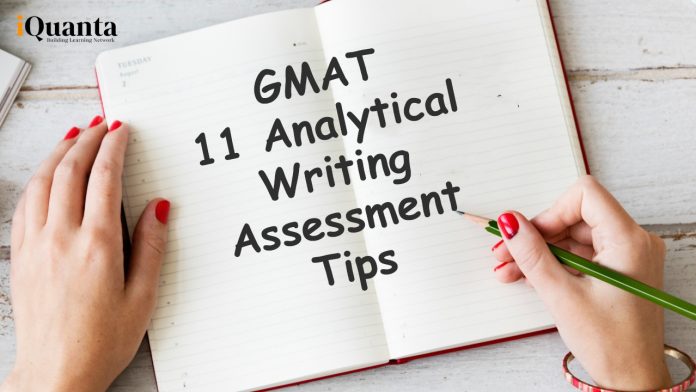In this blog, we share 11 best tips for analytical writing assessment for GMAT preparations. The analytical writing assessment is considered the least important of GMAT scores.
However, it doesn’t mean you do not practice and prepare for this section. AWA is designed to measure the candidate’s ability to think critically and communicate ideas. The purpose of this section is to draw an appropriate and constructive critique based on a specific line of thinking. Scoring high on this section is an advantage. As AWA assesses only your capacity to think critically and write analytically.
The analysis of argument has a premise and a conclusion. The candidate should find the gaps between the two, find the flaws in the prompt, and prove the argument is wrong because of certain missing elements. Read on to understand the tips to write an effective essay by analyzing the reasoning behind an argument, without expressing your opinion on the subject itself.
How Does Essay In Analytical Writing Assessment, GMAT Score?
Each essay in GMAT AWA scores on two combinations – professional essay raters and computer scoring program. Various factors that affect your response score are:
- The quality of your ideas
- Your ability to express your ideas in a structured and organized form
- Relevant supporting reasons and examples
- Control over the language, standard written English
List of 11 Tips For Successful Analytical Writing Assessment – GMAT
Analytical Writing Assessment has only one essay to write. But it should be backed with valid examples and evidence to support your argument. There is a lot of confusion among the candidates when it comes to preparing for the AWA section for GMAT preparations. So, we have created a list of the best analytical writing assessment tips to help you get started.
Get the GMAT Online Coaching by iQuanta
Study Sample AWA Templates
Sample AWA templates will help you give an overview of the generic format your essay should follow. Having a clear idea of how you will critically analyze your argument can help write an effective essay. Study the sample templates and create your own. An efficient AWA template follows a structure: an intro, a body, and a conclusion.
An intro should restate the flaws of the argument, which usually relies on assumptions with no clear evidence. A flawed argument makes the prompt topic unconvincing.
The body has 3 to 4 paragraphs. Each para will highlight the flaws, state evidence to strengthen your argument, with valid examples to support.
The concluding para states the reasons that the author’s argument is weak and illogical.
Check Out the List of Topics of Past Analytical Writing Tips Essay
It is advisable to check out the list of prompt topics from the past analytical writing assessment essay. You can find these at the Official GMAT Exam Website: Prepare & Plan for Business School: Analysis of an argument topics
Read and Re-read the Prompt
The arguments that you will analyze in the GMAT exam AWA section will be on a general interest topic like science, politics, etc. You don’t need an in-depth knowledge of any specific field to write the essay. However, the most important thing to remember is to read the question carefully. Re-read the question till you understand the author’s intent behind it. You are supposed to analyze the question critically, without stating your opinion.
Understand and Follow the Directions
Understanding the directions in the question asked in this section is a critical step. The directions are specific. You have to write a critique argument on the given prompt topic’s strengths and weaknesses. The section is not about a well articulated or thoughtful piece written based on your personal opinion. Analyze the prompt and write critically around the given topic. Simply, do as directed.
Do Not Start Writing Immediately
Before you begin writing the essay, take a few minutes to think about the question. Understand the prompt through the author’s context. Plan your response by working out various options in your mind. Take a few minutes to jot down main points or ideas that you feel can be helpful. Stay focused, and do not let your views or opinions distract you from the topic.
Sketch an Outline and Create a Structure
Sketch a brief outline of the ideas/points you jotted down earlier. Develop a clear structure that consists of an intro, body, and conclusion. The intro should have one paragraph, the body should comprise 3 to 4 paragraphs, and the last paragraph should state the conclusion. Write a decently framed essay. A lengthy essay will not get you good scores.
Make Your Essay Stand-out
You do not have to flaunt your linguistic prowess when writing the essay for analytical writing assessment, GMAT. Use short and crisp sentences. Write in simple and understandable English. Make use of accurate facts to support your argument. You can use quotes to enhance your conclusion. Your essay doesn’t have to be creative, but it should be content rich. Use headings and subheadings wherever it seems necessary. It should be an easy read.
Time Management
Remember, you have 30-minutes to plan and write your response. Follow this simple strategy to manage your time to finish writing the essay on time. Spend a few minutes reading and re-reading the question. And a few minutes writing the pointers that could help frame the required response. Take 2 to 3 minutes to find suitable examples to support your argument. Spend good time to write your first draft, as this will help you write your essay. Once you finish writing your essay, make sure you have enough time to recheck what you have written and make necessary changes.
Keep Analysis Brief and It Should Read Like a Narrative
It is advisable to keep the argument analysis brief. Let’s understand what should be there in your essay introduction. Your essay intro should restate the main argument of the prompts and highlight the flaws mentioned. Each body paragraph should focus on the particular flaws in the argument prompt topic – highlight the flaw, state the reason it’s a flaw, and state how the argument could have been clear. The conclusion should summarize how the flaws affected the validity of the argument.
Work on Your Language
It is important to keep your language simple and clear, sentences short and easily readable. Concise sentences make the flow of ideas logical and to the point. This is not a test of your rich vocabulary or linguistic skills. The candidate only has to provide an argument that proves that the given premise doesn’t necessarily lead to the mentioned conclusion in the most logical manner.
Practice
Reading the previous year’s AWA essay is not enough. Practice a few prompts at home within the 30-minute time frame, as you will get in the GMAT exam. There are numerous prompts to practice. It will help you create your own AWA template and structure your argument based on relevant factual examples.
Evaluating Analytical Writing Assessment – GMAT
Your response in AWA is evaluated by a professional essay rater and computer scoring program on the following points:
- How structured and organized is your argument expressed and presented?
- If relevant reasons and examples were provided to support your argument.
- The use of standard written English – framing of sentences, usage of vocabulary, and clarity of thoughts.
In case of disparity among the scores, another professional essay evaluator checks your essay for a final score.
Score Guide For AWA GMAT
Let’s understand the meaning of your AWA score.
| Score | Meaning |
| 6 | Outstanding |
| 5 | Strong |
| 4 | Adequate |
| 3 | Limited |
| 2 | Seriously Flawed |
| 1 | Fundamentally Deficient |
| 0 | No Score |
| NR | Blank – when no response has been submitted |
As analysis of argument is a writing task, candidates assume this is a non-challenging section. It is essential to look at the bigger picture. The prompts given in the analytical writing assessment section of GMAT test the analytical, logical and critical knowledge of the candidates. The essay cannot be written without understanding the intent of the author. You have to provide factual examples to prove your argument and evidence to strengthen your conclusion.
GMAT Info: In a year, a candidate can attempt GMAT 5 times and 8 times in a lifetime.
Willing candidates looking to prepare for GMAT can check out iQuanta’s course for preparation.




